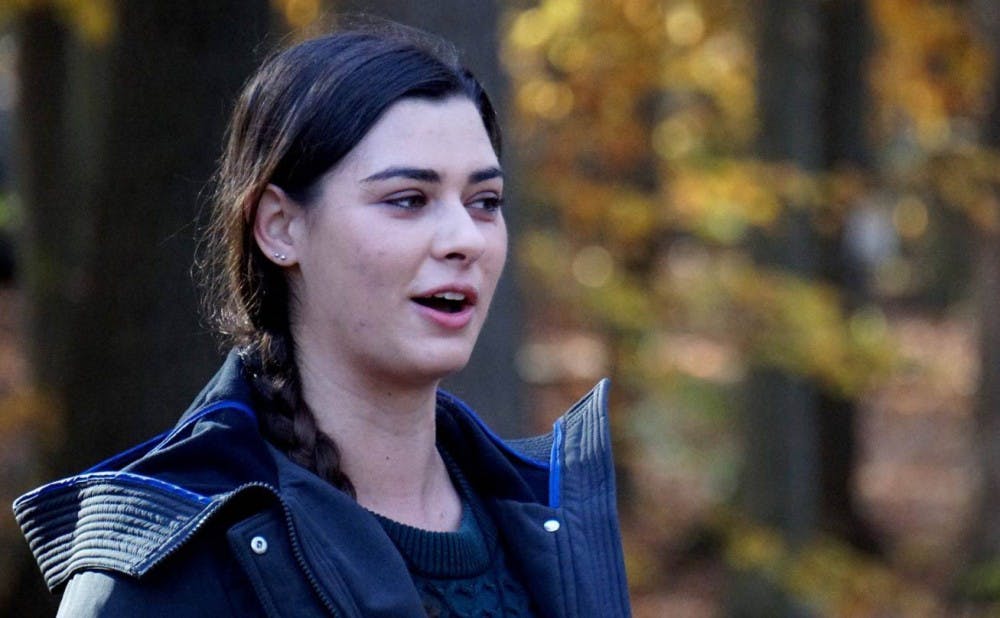"Warm," "soft-spoken," "a curious mind," "respectful", an "infectious smile" and a "lovely personality"—all ways that colleagues, family and friends chose to describe Madison Pedrotty.
Pedrotty, a first-year graduate student, died in a car crash May 31, on the way to her maternal grandfather's funeral. Twenty-three at the time, she graduated from the University of Pennsylvania in 2017 and became a Ph.D. student at Duke, studying molecular cancer biology.
She is survived by her parents Tina and Steve and her brother Dominic, 21.
Her mother recalled Madison’s devotion to others. She did community service projects in several of the countries she visited, but also served the community in Philadelphia during college—each Friday, Madison would go with a group to take a pot of coffee and drink it with the homeless.
‘It’s a way to give someone their humanity, Mom—just sit and visit and talk,” she said.
Madison became passionate about modern medicine quickly after taking a cancer cell biology class as an undergraduate, her mother said. She was accepted into seven different Ph.D. programs, but ultimately chose Duke because she was excited about the work that Donald Patrick McDonnell, professor of pharmacology and cancer biology, was doing.
“It was a gut feeling, like that was where she needed to be,” her mother said.
McDonnell said that the molecular cancer biology program was lucky to recruit the “incredibly accomplished young lady.” Ann Marie Pendergast, Anthony R. Means Cancer Biology Professor, actively recruited her because of her experience, he said.
When Pedrotty came to Duke, she began research on why breast tumors are not attacked by the immune systems and other cancers are, in order to develop methodologies to actually make the immune system attack breast tumors, McDonnell explained.
“It was a very ambitious project. She had developed a logical series of studies to address this,” McDonnell said. “To be honest with you, she was far more mature—not only in her personality, but in her scientific thinking—than anyone I have ever met in a first-year graduate student.”
Pendergast wrote in an email that it was difficult for her to process the news of Pedrotty’s passing, as she had only just seen Pedrotty working in McDonell’s lab down the hall.
“I believe that Madison would have become a great scientist who would have made major discoveries, and I am very sad that she was not able to fulfill her promise,” Pendergast wrote.
Aside from her scientific passions, Pedrotty’s big passion was traveling, according to her mother. Coming from a military family, Madison and her younger lived many places growing up—visiting 39 countries.
“We had a lot of fun that way," her mother said. "One Thanksgiving in particular, we hiked Mt. Sinai."
Pedrotty most recently completed a mission trip in Peru with her brother. Previously, she visited several European and African countries while living in Italy for five years. She spent her elementary years at an Italian school, so she was fluent in Italian and Spanish.
McDonnell recalled a time when she had displayed this fluency in the lab. He remembered walking into lab one day to find Pedrotty speaking in Italian to another graduate student who had just joined.
The Maryland resident bonded with others in the McDonnell lab, including postdoctoral fellow Binita Chakraborty. Madison was one of the most dedicated students that Chakraborty had ever seen, she recalled.
“I still remember January 17 this year when a big blizzard came across North Carolina and everything got closed. She braved that snow and walked from her home to lab just to finish her experiment,” Charkraborty wrote in an email.
While rotating in Associate Professor of Medicine Dorothy Sipkins’ lab, Pedrotty inspired Sipkins with her dedication and devotion.
Sipkins wrote that Pedrotty exuded a special kindness and clarity of purpose, and that her imprint was remarkable.
“She just had this wonderful, honest devotion to the work she was doing and a true loveliness surrounding her being," Sipkins wrote in an email.
Pedrotty’s mentor in Sipkins’ lab, postdoctoral associate Gaia Cantelli, wrote that she had a heartwarming, contagious enthusiasm for life and an inspiring real passion for science.
“She inspired me every day that we worked together and she reminded me of all the reasons we do science in the first place—to answer important questions and to help people, no matter how hard the road gets,” Cantelli wrote in an email.
Her brother was driving when the wreck occured. He survived the crash and was hospitalized. Tina Pedrotty said that Madison would not be buried until her brother was out of the hospital.
Tina Pedrotty said that her daughter had written her the “sweetest Mother’s Day card ever” this year.
“Not very many people have to bury their kids, thank God,” Mrs. Pedrotty said. “You just don’t want to think about it."
McDonnell, whose lab she had chosen to complete her Ph.D. work in, noted her warmth and respectfulness.
“I cannot impress upon you how special of a person she was," he said.
Bre Bradham contributed reporting.
Correction: An earlier version of this article incorrectly stated that Pedrotty was driving to her maternal grandmother's funeral. The Chronicle regrets the error.
Get The Chronicle straight to your inbox
Signup for our weekly newsletter. Cancel at any time.

